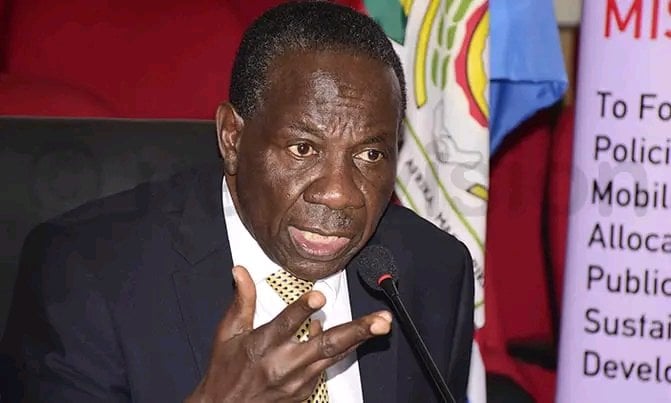Give govt more taxes to stop borrowing - Kasaija

Finance Minister Matia Kasaija
What you need to know:
- Mr Matia Kasaija says the only way for government to stop borrowing, is for Ugandans to pay more taxes and stop unnecessary demands.
Finance Minister Matia Kasaija has said Ugandans need to give government more tax revenue as one of the mitigation measures to curb mounting debt levels.
Speaking in a telephone interview at the weekend, Mr Kasaija told this publication that it was difficult for government to stop borrowing amid growth in demands yet tax revenues continue to be low.
“Give me [government] more taxes so that I don’t have to borrow. Give me taxes … stop complaining when I increase taxes,” he said, noting that Ugandans should as well stop demanding too much from government.
“If you are demanding salary increases, you want roads to be tarmacked, you want this and that. Then, I have got to borrow either internally or externally,” he said, adding that taxes collected taxes cannot fund current demands.
Mr Kasaija was responding to this publication’s inquiries in regard to mounting debt, which State Minister for Planning Amos Lugolobi last week, said was no longer sustainable.
It is the first time government has conceded that debt stocks have reached unsustainable levels having surged to above the 50 percent threshold in just less than two years.
While speaking at the launch of the National Development Plan III Mid-Term Review last week, Mr Lugoloobi, said public debt was now at 54 percent due to increased borrowing to mitigate challenges resulting from Covid-19 and other disasters such as locusts.
“Today, debt to GDP is 54 percent. So, we have already gone beyond the threshold of 50 percent,” he said.
Debt servicing and repayment has become a burden to Uganda, taking up the biggest portion of the National Budget.
However, Uganda’s tax to gross domestic product (GDP) ratio, which has stagnated to below 12 percent, is low to support mounting debt servicing.
Mr Ramathan Ggoobi, the Ministry of Finance permanent secretary at the weekend told Daily Monitor that as of May 2022, the stock of public debt had grown to Shs77.9 trillion ($20.722b) from Shs73.8 trillion in December 2021, of which, Shs29.4 trillion ($7.84b) was domestic and the rest external debt.
However, he indicated, debt is projected to grow further to Shs90.2 trillion ($24b) during the 2022/23 financial year, of which, $9.31b (Shs35 trillion) will be domestic debt.
Therefore, he said, to mitigate the growing burden, government will reduce accumulation of domestic debt to 1 percent of gross domestic product over the medium term from 4 percent through implementation of the domestic revenue mobilisation strategy, borrowing for strategic projects only such as those that support growth and exports and sequencing commencement of projects by ensuring that only quality and ready projects enter the public investment plan.
Other measures, he said, include rolling out the Public Finance Investment Strategy, which seeks to get alternative financing options and crowding in the private sector to support growth projects that are commercially viable as well as implementing reforms to restore fiscal discipline and budget credibility by limiting supplementary expenditure to what is intended in the law such as unforeseen and unavoidable emergencies, mainly disasters, security threats and perhaps critical industrial policy expenditures needed to support transformation.




